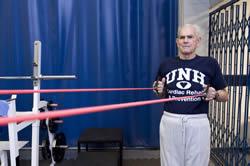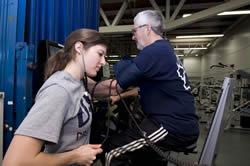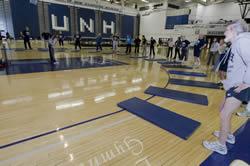History

Dr. Robert Kertzer developed the University of New Hampshire Cardiac Rehabilitation Program in 1978. Dr. Kertzer, who lived a long and active life, was a trained Exercise Scientist and avid reader of literature related to exercise and cardiac disease. He was convinced that the optimal treatment for cardiac disease was activity and was not bed rest. Therefore, in collaboration with Dr. Gladstone, an exercise program for cardiac patients opened its doors on campus. This program was the first of its kind in the state of New Hampshire and it became the model from which all other cardiac exercise programs in the state would be based.
The Program

The University of New Hampshire Cardiac Rehabilitation program is run out of the Department of Kinesiology. Exercise sessions occur both indoors and outdoors at various times during the week.
The program has recently expanded to offer telehealth options as well. Clients are now able to benefit from virtual programming which includes biweekly Blog/Newsletters, videos, and scientific and exercise-related presentations.
In-person exercise sessions begin with monitoring of blood pressure, heart rate, and body weight. A warm-up of slow aerobic activities is designed to increase heart rate, body temperature, and flexibility. The warm-up is followed by an aerobic and resistance program which can last between 30- 45 minutes. All sessions end with a cool-down and biometric monitoring.
Individuals are encouraged to perform aerobic exercise which include cycling, rowing, treadmill walking or jogging, stair stepping, or cross-country skiing on stationary equipment. Also, individuals are encouraged to perform strength-building exercises using Nautilus, free weight equipment, or resistance bands in the fitness center. All activities are individually prescribed, and participants at in-person sessions are monitored by staff.
You and your physician can be updated on your progress as requested. Yearly treadmill tests are encouraged and can be performed by your cardiologist, personal physician, or by the Exercise Science faculty.
The UNH Cardiac Rehabilitation Program runs in tandem with the Cardiac Prevention Program. These clinical cardiac programs are also a training site for UNH graduate and undergraduate students in Exercise Science. Senior level students perform duties in the program and report to the Program Director. As part of the remote programming, we publish bi-weekly Blog/Newsletters, provide periodic presentations, have a collection of virtual videos that are accessible to all clients, and we host student-led seminars on various scientific topics.
In-person sessions are held at the UNH Field House at 145 Main Street in Durham, NH. Facilities include the UNH indoor and outdoor track, gymnasium, and the Employee Fitness Center, which has a variety of machines and exercise equipment.
Who is the Program For?
The Phase III and IV Cardiac Rehabilitation Program is designed for anyone with heart disease who has completed a clinic-based cardiac rehabilitation program. Family members or care givers are also welcomed to participate in the program. Likewise, those without diagnosed heart disease but who have known factors that may predispose them to heart disease (i.e., smoking, overweight, high blood pressure, high blood cholesterol) are welcome to join our UNH Cardiac Prevention Program.
What are the Benefits of the Program?
Among the many benefits of regular physical activity are improvements in an individual’s ability to perform activities of daily living, an improvement in psychological well-being, decreases in body fat, blood pressure and blood cholesterol, improved blood glucose control, increased bone mineral density and a decreased risk for re-occurrence of a cardiac event.
Enrollment
Once your enrollment paperwork, medical history, and physician clearance are completed and accepted, you will be contacted to schedule a time for orientation into the program. Individuals interested in the program should contact:

Kimberly Brian, MS, ACSM-CEP, CCT
Dept. of Kinesiology
New Hampshire Hall Room 213
124 Main Street
Durham, NH 03824
(603) 862-0597
Kimberly.Brian@unh.edu
